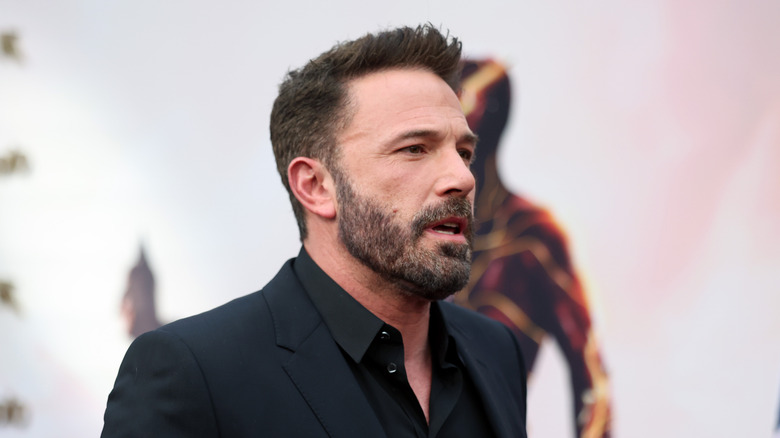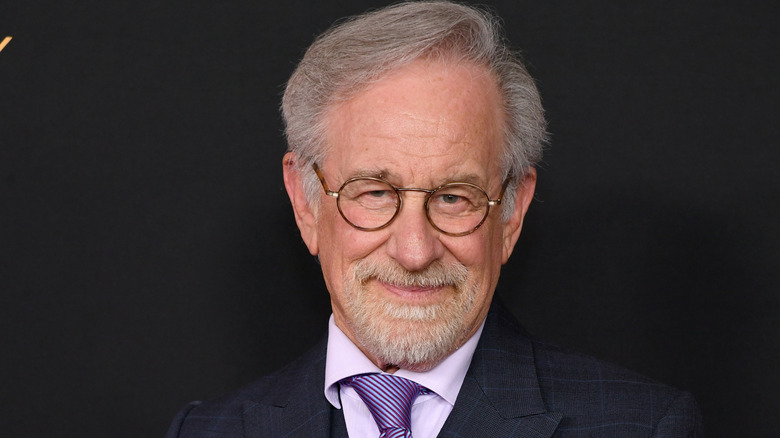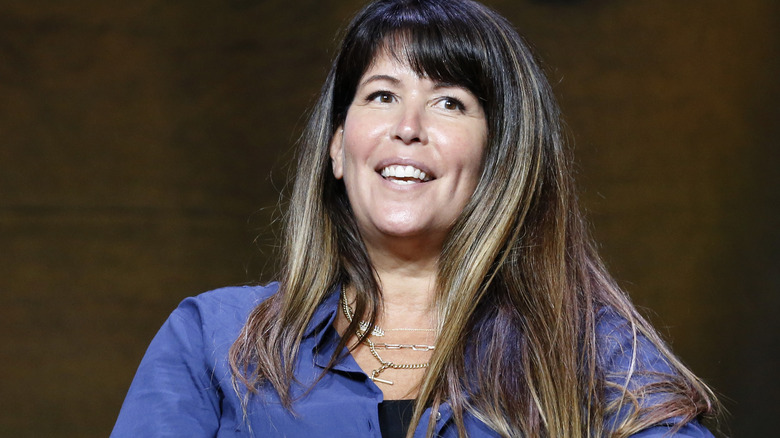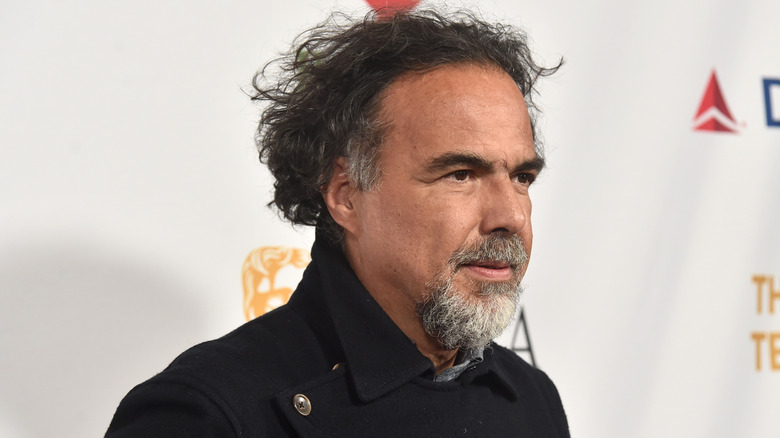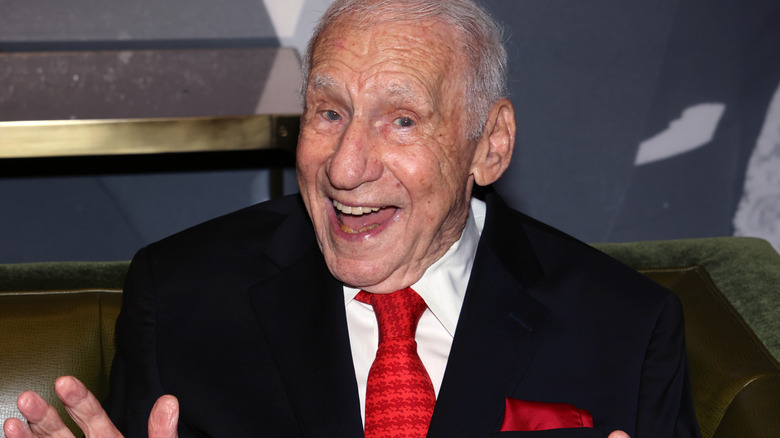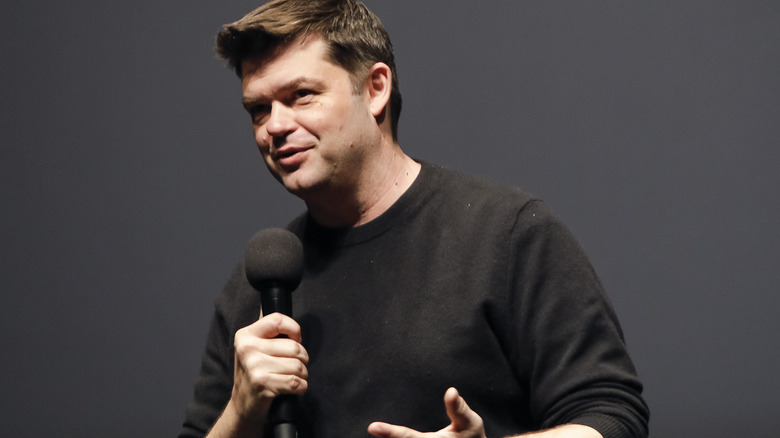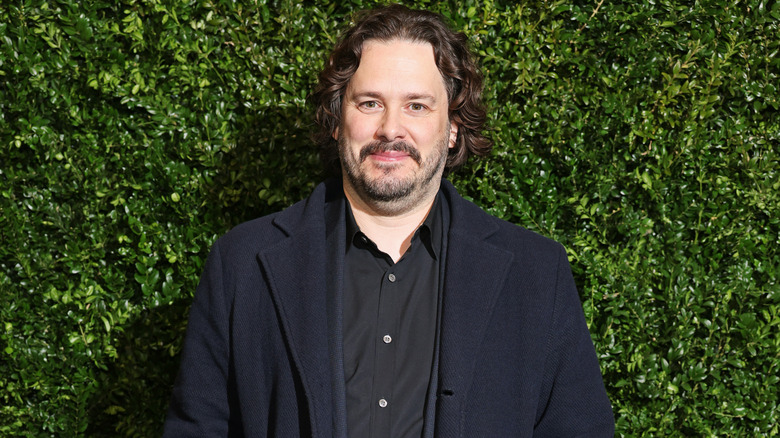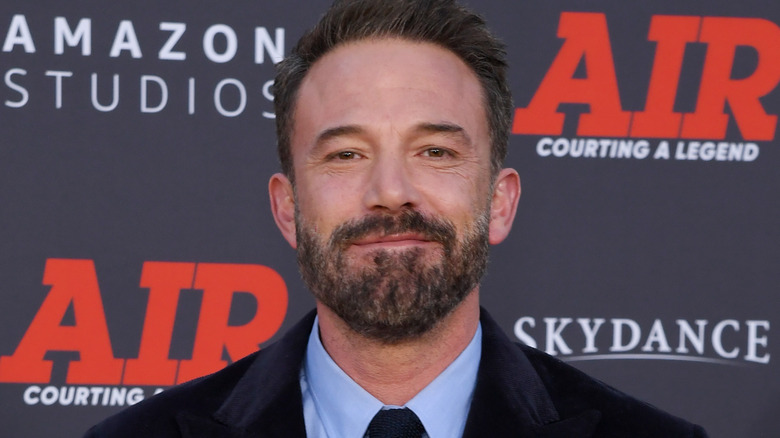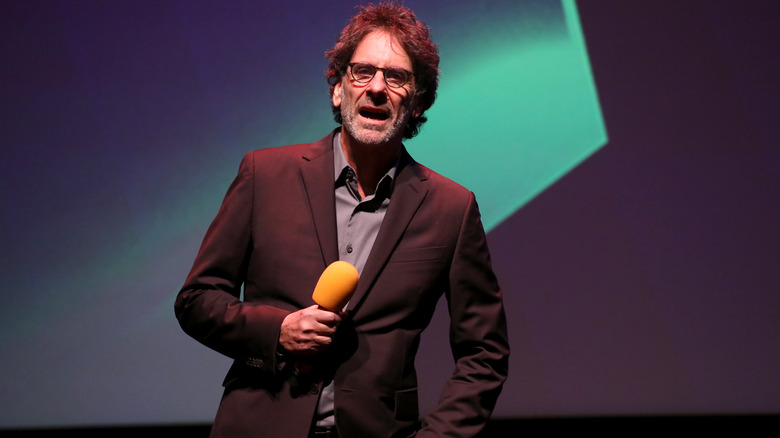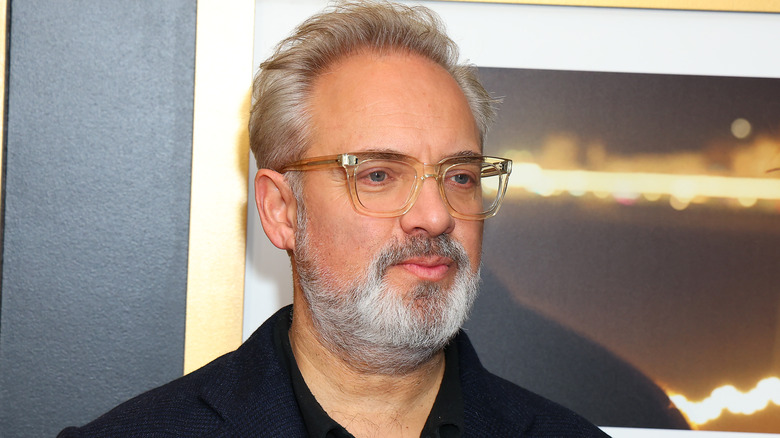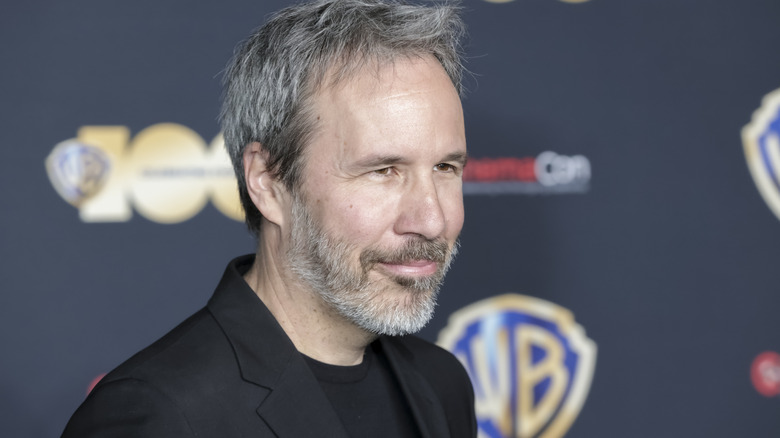Filmmakers Who Bashed Streaming Services But Have Worked With Them Anyway
While audiences were fairly quick to embrace streaming services, with a sizeable number now using them almost exclusively for their film and television watching needs, the people who actually make the movies and TV shows took a little more convincing. At this point, almost anyone you can think of who works either in front of or behind the camera has been involved in original content for a streaming service, with some even trumpeting the many ways that streaming services are superior to the traditional distribution models — or at least, what used to be considered traditional.
Of course, not everyone is convinced that streaming is the future. In fact, there are some people that still haven't done any work in the streaming market and likely never will — Quentin Tarantino, Christopher Nolan, and Clint Eastwood come to mind. What's most fascinating to look at are filmmakers who have had harsh words for either a particular streaming service or the streaming marketplace in general, yet have also voluntarily created content for that space — with some signing lucrative deals to do so.
Steven Spielberg
When streaming movies had finally reached the point where they were good enough to be including in Oscar conversations, a debate arose as to whether a movie made specifically for a streaming service should be eligible to be nominated for an Academy Award.
One of the most vocal opponents to that suggestion was Steven Spielberg, who believes that the Oscars are for theatrical experiences and that movies made for streaming services are essentially television films and therefore should only be eligible to win Emmys. In response, Netflix started releasing its prestige films into theaters for limited runs, specifically so it could say they did, in fact, run in theaters — and Spielberg took issue with that as well.
Spielberg was one of many filmmakers who bristled at Warner Bros.' controversial decision to release all of its 2021 films on HBO Max the same day they hit theaters, typically without giving the directors of said movies any say in the matter. Spielberg also accused streaming services of taking advantage of the number of bumps they all got during the pandemic as an excuse to jack up subscription fees. Meanwhile, he was one of the producers of Netflix's "The Trial of the Chicago 7," eventually nominated for seven Oscars in 2020 and which Spielberg was interested in directing at one point. And he is also helping to produce Bradley Cooper's upcoming biopic of composer Leonard Bernstein, also for Netflix.
Patty Jenkins
The movie whose unusual release ended up inspiring Warner Bros. to bring all of its 2021 theatrical releases to HBO Max the same day as theaters was "Wonder Woman 1984," which was released that way the previous December because of what the COVID-19 pandemic did to the theater business at the time. Director Patty Jenkins had no say in that decision, so we aren't using that against her, nor are we doing so for any of the other directors who thought they were making movies for theaters but were informed after the fact that Warner Bros. had other plans.
However, Jenkins did sign a deal in 2019 with Netflix, valued at $10 million, to release content for the platform. So when she said at CinemaCon (via Variety) two years later, "All of the films that streaming services are putting out, I'm sorry, they look like fake movies to me," it felt a little disingenuous as she had already displayed a willingness to work with streaming services and sign eight-figure deals with them.
Sure, technically, Jenkins' deal was to produce series for Netflix — which, to her credit, she admitted to having a deal with the streamer shortly after making that statement — and it's Netflix's movies that she was calling out. But it feels a little bit like Jenkins is trying to have it both ways, where she can make money off Netflix while still distancing herself from and criticizing the service for the movies it produces.
Alejandro G. Iñárritu
One of the best filmmakers working today is Alejandro G. Iñárritu, a fact that is difficult to dispute considering that he has won the Oscar for Best Director twice in the last 10 years — for "Birdman" and "The Revenant" — not to mention directing Leonardo DiCaprio to his long-overdue first Best Actor win for the latter film. His 2017 virtual reality short "Flesh and Sand" also scored a Special Achievement Academy Award, a rare feat as the Academy is very picky about such awards — only 17 have been given out in the entire history of the Oscars.
Still, despite being willing to forge new technological ground in storytelling, Iñárritu complained of the "dictatorship of the algorithm in the world we are living in" when speaking at the Sarajevo Film Festival in 2019 (via Variety). He lamented that streaming platforms are designed to feed people more of the same types of content they have already watched, which limits their scope to what they already know they'll like and makes them likely to discover new or different types of experiences.
Nevertheless, Iñárritu's most recent film, "Bardo, False Chronicle of a Handful of Truths," was distributed by Netflix in 2022 — and it's easy to make the argument that a streaming service is the only place a long, ambitious, and expensive vanity project like "Bardo" would even find a home anymore.
Mel Brooks
The first movie that Mel Brooks wrote and directed was 1967's "The Producers." Considering he'd already been a filmmaker for at least 20 years before ownership of movies on home video had become mainstream, it's easy to assume that he has pretty strong opinions about how movies are best experienced in a theater above all else. That, combined with the fact that the stage and screen legend was 81 years old when Netflix debuted the streaming portion of its service in 2007, means nobody should be surprised that Brooks told The Advocate in 2018, "I'm afraid to make another movie because I don't want it to be seen by millions of people on a telephone."
Brooks also added, "Comedies must be seen by at least 100 people in some kind of theater." He might not have called out streaming services specifically, but it's pretty clear what he is taking aim at. Now, if anybody can be forgiven for — and has earned the right to — a little bitterness about the way people watch content these days, it's Mel Brooks. Which makes it all the more surprising that, in 2023, he followed up one of his most beloved films with the limited series, "History of the World, Part II" — and released it exclusively on Hulu. And this isn't just a case of someone putting their name on something either, as Brooks is a credited writer on the series as well as its narrator throughout.
Christopher Miller
Best known as half of the celebrated writing-directing-producing duo of Phil Lord and Christopher Miller — currently enjoying accolades for writing and producing 2023's "Spider-Man: Across the Spider-Verse" — Miller has had plenty to say about streaming services. In particular, in 2022 he joined the growing chorus of people who took issue with how little creators were getting paid for the content they produced for streaming services — one of the things that led to the 2023 WGA writers' strike — complaining that streamers might pay talent more up front than traditional movie and television studios, but that the nature of streaming limits their access to long-term profit sharing.
Like many others, Miller also feels that streamers shouldn't be so secretive about their profits and other financial information; doing so means that creators are at the mercy of just taking a streaming company's word as to what it has made and what it should have to pay to the people who create the content. All that being said, Lord and Miller produced the 2021 animated film "The Mitchells vs. the Machines" for Netflix, and Miller went solo in creating and directing the murder mystery anthology series "The Afterparty" for Apple TV+, with the second season just underway. Lord Miller Productions also teamed with Netflix for the 2020 animated series "Hoops."
Edgar Wright
There are a few directors who have managed to avoid having any of their films labeled as rotten by Rotten Tomatoes, and Edgar Wright is among that elite group. Best known for the horror comedy "Shaun of the Dead" and its spiritual follow-ups "Hot Fuzz" and "The World's End," Wright has also proven his skill at other genres with the psychological horror film "Last Night in Soho" and the heist romp "Baby Driver."
Den of Geek recently asked Wright for his thoughts about streaming services, which has become an almost mandatory question for filmmakers within the last five years or so — a point that Wright wanted to address. Wright told the outlet, "I just get a bit bored of the endless oxygen taken up by talking about streaming all the time." He went on to say that he doesn't think streaming services are the game-changing innovation they are made out to be, and that he doesn't see a movie going from theaters to a streaming service as any different from when movies go from theaters to television.
Wright also complained that audiences have too much control over the experience when they stream, saying they are too free to take breaks and allow themselves to be distracted versus when they go to a theater. Still, Wright has teamed with Netflix to develop an anime adaptation of "Scott Pilgrim vs. the World," which will see the cast of his cult classic 2010 film reprise their respective roles.
Martin Scorsese
Over the last few years, Martin Scorsese has probably had more articles written about his opinions on movies and cinema than the movies he has actually made. The most frequent target of his criticism are superhero movies, but he has also had plenty to say about streaming services and their effect on cinema as well. Not content simply giving interviews and answering other people's questions on the topic, Scorsese isn't afraid to write up entire op-eds to get his points across — and he did so in a piece he wrote for Harper's magazine in 2021.
In an essay subtitled "Federico Fellini and the lost magic of cinema," Scorsese takes aim at streaming services in their role in robbing cinema of its magic — that is, except for Mubi and The Criterion Channel, which he cites as the only two services that actually curate their libraries. Beyond that, he wrote, "The art of cinema is being systematically devalued, sidelined, demeaned, and reduced to its lowest common denominator, 'content.'" Like Iñárritu, he also takes issue with the way streamers are algorithm-based, complaining, "Algorithms, by definition, are based on calculations that treat the viewer as a consumer and nothing else."
You already know what we're going to say here, though — Scorsese didn't seem to have an issue with the apparently poorly-curated Netflix putting out his 2019 epic "The Irishman," or for Apple TV+ to be the place to watch his latest film, "Killers of the Flower Moon."
Ben Affleck
Even though he is primarily known as an actor, Ben Affleck has long established himself as a respected director as well. In fact, his filmmaking career has been more consistent than his acting career, with 2016's "Live by Night" being the only one of his directorial efforts to not receive critical acclaim. His latest triumph in the director's chair, 2023's "Air," depicts Nike courting the then up-and-coming Michael Jordan to be the namesake of its latest shoe line. "Air" was co-produced by Amazon Studios and was initially intended as a streaming-first release, though Amazon decided to give it a theatrical run as well.
With Affleck being so protective of his filmmaking output, it's surprising that one of his movies was initially set for streaming despite his thoughts on streaming services. He had previously stated that streaming services crank out way too many movies for any significant number of them to be great, and likened them to a content assembly line. To be fair, he was talking about Netflix in particular with those comments — but he didn't have any trouble starring in Netflix originals "Triple Frontier" or "The Last Thing He Wanted," the latter of which scored a mere 5% on Rotten Tomatoes. Not only has Affleck participated in Netflix's supposed bad movie assembly line that he complains about, but the actor also starred in the Hulu original "Deep Water" in 2022, which also didn't impress critics or audiences.
Joel Coen
The Coen brothers have one of the most celebrated bodies of work in the history of film, which is even more astounding given its impressive size. The duo are known for displaying their obvious love for cinema in every frame of their work, with every inch of scenery and every syllable of dialogue finely crafted in a way that few others do. If anyone doesn't view movies as merely a consumer product, it's Joel and Ethan Coen — and Joel in particular made that clear in an episode of the "Team Deakins" podcast (via The Playlist), hosted by cinematographer and frequent Coen collaborator Roger Deakins.
Joel pointed out that while traditional studios typically set a maximum time limit on the projects they buy, it's his experience that streamers instead have a minimum, and that it's all about having the largest amount of content possible. "Most streaming services just want to buy by the yard," Joel explained, suggesting a quantity-over-quality approach in how the streaming companies fill out their libraries. And yet, as of this writing, the Coen brothers' most recent project together was "The Ballad of Buster Scruggs," an anthology film they made for Netflix in 2018. Since then, each has worked on their own solo project — and Joel's was the 2021 movie "The Tragedy of Macbeth," released by Apple TV+.
Sam Mendes
Sam Mendes is among the last of the big name Hollywood filmmakers who has remained a holdout in terms of directing a movie for a streaming service. His feelings on streaming aren't as overwhelmingly negative as some of the other members of that group, or even among those who have made streaming movies. Still, he told The New Yorker in 2018, "These streaming companies are going to steamroll the traditional studio system." It might have seemed like an extreme opinion in a pre-COVID world, but we now know that he was a lot more on the money with that prediction — and how soon it was going to happen — than he could have possibly realized at the time.
Mendes also said that the streaming services — and much of modern cable television — have fallen prey to the "never-ending movie" approach to storytelling, where TV and streaming series aren't so much shows as they are extended films that play over many hours across multiple years. He feels that this has conversely affected movies in a negative way, with people no longer knowing how to consume a concise, two-to-three-hour tale that starts and ends in that timeframe. While Mendes has yet to write or direct a streaming movie and perhaps never will, he isn't completely averse to that world, as he was a producer on the 2017 historical drama "Britannia," a co-production with Amazon Prime Video.
Denis Villeneuve
What makes the disconnect between Denis Villeneuve's thoughts on streaming services and his work with them so interesting is that the one he went especially hard on is the exact one he would also work directly with. His 2021 adaptation of Frank Herbert's "Dune" was one of the movies that Warner Bros. brought to theaters and HBO Max on the same day, and Villeneuve was arguably more upset about the decision than any of the other directors whose work suffered the same fate.
In fact, Villeneuve went the Martin Scorsese route and penned his own article on the subject. In an essay for Variety, the filmmaker did not mince words, writing, "There is absolutely no love for cinema, nor for the audience here. It is all about the survival of a telecom mammoth, one that is currently bearing an astronomical debt of more than $150 billion." Taking aim at HBO Max directly, he called the service a failure, claiming, "AT&T decided to sacrifice Warner Bros.' entire 2021 slate in a desperate attempt to grab the audience's attention."
Even after all that, Villeneuve remains attached as executive producer to the upcoming Max prequel series "Dune: The Sisterhood." He was originally slated to direct episodes as well, but his work on "Dune: Part Two" kept him too busy. Yet he is continuing to work on — and will make money off of — a Max original series after calling its predecessor a failure and mocking its parent companies.
